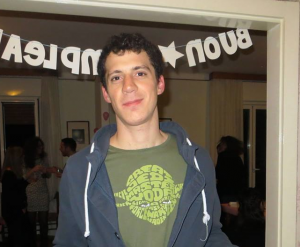Gianluca was born and raised in the northern part of Italy: Jesolo and Eraclea, near Venice, and then  Trieste. In 2016 he moved to Glasgow (Scotland) where he was impressed by the beauty of the country, the kindness of its people and also the sweetness of the Scottish accent and the cheerfulness of its weather. It was love at first sight.
Trieste. In 2016 he moved to Glasgow (Scotland) where he was impressed by the beauty of the country, the kindness of its people and also the sweetness of the Scottish accent and the cheerfulness of its weather. It was love at first sight.
He studied at the ‘Università degli studi di Trieste’ where he obtained the Bachelor Degree in Industrial Engineering and afterwards, in march 2017, the Master Degree in Mechanical Engineering after a six months’ internship at the Aerospace Center of Excellence in Glasgow (University of Strathclyde). During the Master Degree he studied hot and cold mechanics including Computational Thermo-Fluid Dynamics, Optimization Algorithms, Simulation and Analysis of Vibration Signals, Machine Design and Mechanical Systems. He developed the master thesis, “Fast Belief Estimation with h-Decomposition for Evidence-based Preliminary Design of Spacecraft”, within a project with the involvement of ESA, ESTECO, SSTL and the University of Strathclyde. The research output was a novel approach to model complex engineering systems in the form of an interconnected nodes’ network, where the goal was the computationally affordable optimization under uncertainty, within the Imprecise Probability Theory.
He occasionally worked as restaurant waiter, parking attendant, shop assistant, church organist and he taught theory of music and solfeggio in a local music school.
Besides high school studies, he studied piano at the Conservatory ‘Cesare Pollini’ in Padova where he obtained the fifth year degree.
While studying at University, he enjoyed the exploration of many caves in the Trieste Carso, together with the oldest and still existing caving group in the world: ‘Commissione Grotte Eugenio Boegan della Società Alpina delle Giulie’ founded in Trieste in 1883.
He likes music, reading, traveling, speleology, comic movies, tragicomic movies and black comedy, not necessary in this order.
Since 2009 he plays in ‘De Paluda Fiois’ band, a comic and bucolic band from Paluda which every year composes and records pretty funny Christmas songs.
Research output:
Absil CO, Filippi G, Riccardi A, Vasile M. A Variance-Based Estimation of the Resilience Indices in the Preliminary Design Optimisation of Engineering Systems Under Epistemic Uncertainty. EUROGEN, Madrid: 2017.
Vasile M, Filippi G, Ortega Absil C, Riccardi A. Fast belief estimation in evidence network models. EUROGEN, Madrid: 2017.
Filippi G, Vasile M, Korondi PZ, Marchi M, Poloni C. Robust design optimisation of dynamical space systems. 8th Int. Syst. Concurr. Eng. Sp. Appl. Conf., Glasgow: 2018.
Filippi G, Marchi M, Vasile M, Vercesi P. Evidence-Based Robust Optimisation of Space Systems with Evidence Network Models. IEEE Congr. Evol. Comput. CEC, Rio De Janeiro: 2018.
Filippi G, Krpelik D, Korondi PZ, Vasile M, Marchi M, Poloni C. Space systems resilience engineering and global system reliability optimisation under imprecision and epistemic uncertainty. Proc. Int. Astronaut. Congr. IAC, Bremen: 2018.
Filippi G, Vasile M. A Memetic Approach to the Solution of Constrained Min-Max Problems. 2019 IEEE Congr. Evol. Comput. CEC, Wellington: 2019.
Filippi G, Vasile M. A Multi Layer Evidence Network Model for the Design Process of Space Systems under Epistemic Uncertainty. EUROGEN, Guimaraes: 2019.
Filippi G, Vasile M. Evidence-based resilience engineering of dynamic space systems. Proc. Int. Astronaut. Congr. IAC, Washington: 2019.
Filippi G, Vasile M, Krpelik D, Korondi PZ, Marchi M, Poloni C. uncertainty. Acta Astronaut 2019. doi: 10.1016/j.actaastro.2019.08.024.
Greco C, Gentile L, Filippi G, Minisci E, Vasile M, Bartz-Beielstein T. Autonomous Generation of Observation Schedules for Tracking Satellites with Structured-Chromosome GA Optimisation. IEEE Congr. Evol. Comput. CEC, Wellington: 2019.
Gentile L, Filippi G, Minisci E, Bartz-Beielstein T, Vasile M. Preliminary spacecraft design by means of Structured-Chromosome Genetic Algorithms. IEEE Congr. Evol. Comput., Glasogw: 2020.
Filippi G, Gillespie D, Ross Wilson A, Vasile M. A resilience approach to the design of future Moon base power systems. Int. Astronaut. Congr. IAC: 2020.
Gillespie D, Ross Wilson A, Martin D, Mitchell G, Filippi G, Vasile M. Comparative analysis of Solar power satellite systems to support a Moon base. Int. Astronaut. Congr. IAC: 2020.
Filippi G, Vasile M. Inflationary Differential Evolution forConstrained Multi-ObjectiveOptimisationProblems. International Conference on Bioinspired Optimisation Methods and Their Application BIOMA, Bruxelles: 2020, (accepted).
Filippi G, Vasile M.Network resilience optimisation of complex systems. International Conference on Uncertainty Quantification and Optimisation UQOP, Bruxelles: 2020, (accepted).
Filippi G, Vasile M. Global Solution of Constrained Min-Max Problems with Inflationary Differential Evolution. Optimization and Engineering, 2020, (under review).
Filippi G, Vasile M. Introduction to Evidence-Based Robust Optimisation. In: Vasile M, editor. Optim. Under Uncertain. with Appl. to Aerosp. Eng., Springer Nature; 2020, (in press).
Filippi G, Vasile M. A Multi Layer Evidence Network Model for the Design Process of Space Systems under Epistemic Uncertainty. In: Computational Methods in AppliedSciences,Springer ECCOMAS; 2020, (in press).
